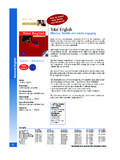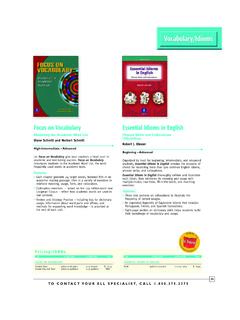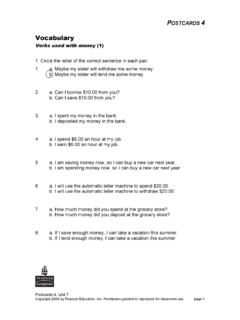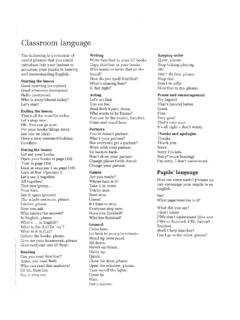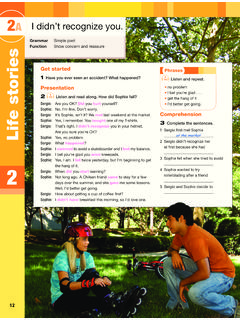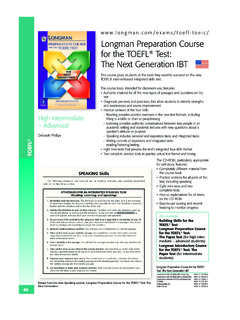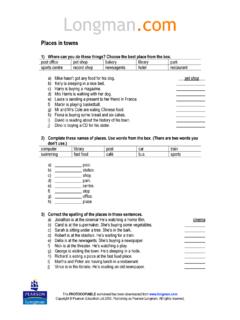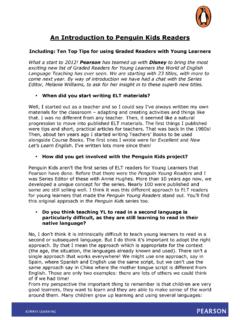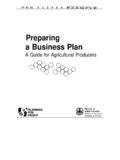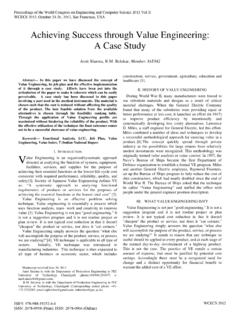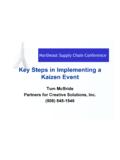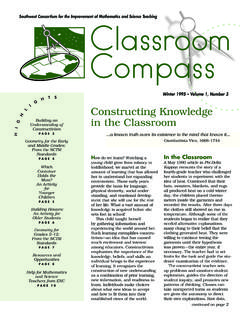Transcription of ISBN 0-13-096478-6 - Pearson ELT
1 IiAll rights reserved. No part of this book may bereproduced, in any form or by any means,without permission in writing from the in the United States of America10987654321 isbn 0-13-096478-6 2000 by Prentice Hall RegentsA Pearson Education CompanyWhite Plains, NY 10606-1951 Editorial Director: Allan AscherSeries Editor: Stella ReillyDevelopment Editors: Susan Ianuzzi, Janet JohnstonDirector of Production:Rhea BankerAssociate Director of Electronic Production:Aliza GreenblattProduction/Design Manager-Multimedia: Paul BelfantiElectronic Production Editor: Carey DaviesManufacturing Manager: Ray KeatingArt Director: Merle KrumperCover Coordinator: Merle Krumper, Eric DawsonIllustrators:Carlotta Tormey, Matthew Daniel, Betsy Day, Andrew Lange, Shelly Matheis, Gabriel Polonsky, Len Schalansky, Catherine Doyle SullivanRealia: Carey Davies, Eric Dawson, Steven Greydanus, Michelle LoGerfo, Wendy WolfInterior Design.
2 Eric DawsonCover Design: Carmine VecchioPrentice-Hall International (UK) Limited, LondonPrentice-Hall of Australia Pty. Limited, SydneyPrentice-Hall Canada Inc., TorontoPrentice-Hall Hispanoamericana, , MexicoPrentice-Hall of India Private Limited, New DelhiPrentice-Hall of Japan, Inc., TokyoPearson Education Asia, SingaporeEditora Prentice-Hall do Brasil, Ltda., Rio de JaneiroReviewers:Peggy Armstrong, Kaplan Educational Services;Leslie Biaggi, Miami-Dade Community College; Ulysses D Aquila,City College of San Francisco; M. Sadiq Durrani, BNC Santa Cruz; Kathy Hamilton, Elk Grove Adult Education; Peter Jarvis, NewYork City Board of Education Adult Division; Kevin Keating, University of Arizona; Margaret Masterson, Bethune Middle School;Joanne Mooney, University of Pennsylvania; Janet K. Orr, Shanghai Centre, Beijing; Cheryl Pearson , University of Houston;Randy Schafer, Free-lance Instructor, Japan; Tammy Smith-Firestone, Edgewood Language Institute; Maria Rita Vieira, YazigiLanguage Schools, BrasiliiiUNIT 1 Lesson 1I m studying in 2Do you have anything to declare?
3 5 Lesson 3 From One Culture to Another8 UNIT 2 Lesson 1 You changed, didn t you?13 Lesson 2Do you remember .. ?17 Lesson 3 Women s Work20 UNIT 3 Lesson 1We could have an international fall festival!25 Lesson 2 You are cordially 3 Fall Foods32 UNIT 4 Lesson 1 Excuses, excuses!37 Lesson 2 You value 3 What is your learning style?44 UNIT 5 Lesson 1Is this the way to the festival?49 Lesson 2 Come to the Winter Fantasy 3 Yon Mi s Journal56 UNIT 6 Lesson 1 Don t try to talk with that sore 2A Healthy Diet65 Lesson 3 Alternative Medicine68 UNIT 7 Lesson 1I planned to buy the smallest TV in the 2I don t have enough 3 Can you save money when you spend money?80 UNIT 8 Lesson 1 Have you paid the tuition bills yet?85 Lesson 2I want to open a checking 3 Each dollar is a piece of your 9 Lesson 1I ll be glad to give you a 2 Careers for Multilinguals101 Lesson 3 Lynn s R sum 104 UNIT 10 Lesson 1 Something wonderful will happen 2 What will you do if you have the time?
4 113 Lesson 3 What will you remember them for?116 TapescriptsT121 ContentsContentsivUnitTopicsFunctionsGet ting to Know PeopleIntroductions; greetings; forms ofaddress; classroom behavior; cus-toms; traditions; culture shock;current/ongoing activitiesMaking formal and informal introductions and greetings; asking forpersonal information; describing actions in progress; using appropriatebehavior in social situations; asking for confirmation; confirming astatement; engaging in small talk; reading for specific information;talking about everyday activities, customs, and traditionsThe Past and Past ExperiencesChildhood; personal events in thepast; historical events; changingroles of men and women; pioneersand explorersSequencing events; asking about the past; talking about past experi-ences; comparing past and present; describing personal life events;asking for confirmation about past events; reading a short magazinearticle.
5 Discussing historical events and achievements; writing a simpleautobiographyInvitations and MessagesHomesickness; holidays; phoneuse; invitations; responses; leisureactivities; reminiscing; the rightthing to do in social situationsTalking about possibility; issuing invitations; accepting and declininginvitations orally and in writing; leaving and taking a telephone mes-sage; writing down a message from an answering machine; talkingabout ongoing past activities; reading for general and specific informa-tion; talking about the right thing to do in social situationsCulture and PersonalityVariations Excuses; classroombehavior; school policies; abilities;personality types; academic goals;interests; learning stylesMaking excuses; comparing classroom behaviors in different cultures;reading about and discussing school policies; identifying personalitytypes; identifying abilities and talents; talking about personal and aca-demic goals; making predictions about the future; discussing learningstyles; writing about future goalsA Town in the United StatesDirections; the neighborhood; hol-idays; community resources; pastand present; comparing two cities;the ideal cityTalking about places in a neighborhood; asking for and giving direc-tions; comparing two places in a town or city; reading for specificinformation; talking about holidays; talking about past habits and cus-toms; writing a journal entry; describing differences between two citiesHealthy Living TodayHome remedies; doctors appoint-ments; health advice; preventiveand alternative medicine; healthyliving; nutritionTalking about health problems and remedies; making suggestions;making a doctor s appointment; giving advice; discussing a healthydiet; talking about food; planning a balanced meal.
6 Listening to adviceand taking notes about a healthy diet; reading about alternative medi-cine; writing a short reportThe Price of Convenience andComfort Stores and shopping;exchanging and returning; adver-tising; consumer scamsTalking about purchases; writing a letter of complaint; exchanging apurchase; comparing features of stores and items; making a catalogpurchase; giving reasons for returning a purchase; analyzing an ad;writing an adMoney MattersCredit cards; opening a checkingaccount; the American consumerTalking about budgets; talking about past actions; opening a checkingaccount; calling an account information line; recording information in acheck register; comparing budgets; interpreting a pie chart; listening toa radio broadcast for specific details; making a food budget; reading anewspaper articleThe Job MarketConflict on the job; employmentads; job search strategies; ther sum Asking for and writing a letter of recommendation; matching skills andqualities with job requirements; reading employment ads; discussingdesirable jobs; calling about an advertised job; identifying parts of ar sum ; writing an employment adWhat the Future HoldsPredictions; memories; futureplans and goalsTalking about predictions; making promises; talking about future goalsand possibilities; sharing memories; predicting future events; talkingabout future plans12345678910vGrammmar andPronunciationCommunication SkillsLISTENING AND SPEAKINGREADING AND WRITING Simple present vs.
7 Present con-tinuous; affirmative and negativetag questions and shortresponses: do/does andis/are Tag questionsMake introductions; ask for personal informa-tion; talk about everyday activities; talk aboutappropriate classroom behavior; confirm astatement; engage in small talk; discuss tradi-tions and customsRead for specific information;set up a personal journal Simple past: regular/irregularverbs; affirmative and negativestatements; yes/no, Wh-, past tagquestions and responses Irregularverbs: the present and past formsSequence events; ask about the past; comparethe past and present; describe personal lifeevents; ask for confirmation; discuss historicalevents and achievementsWrite a paragraph; make a timeline; read a short magazinearticle; write a simple autobiog-raphy; revise written material Modals: can, could, may, might,shouldand their negatives; pastcontinuous: affirmative statementsand yes/noquestions andresponses Reduced syllablesTalk about possibility; invite someone byphone; accept and decline an invitation orally;leave and take a telephone message; talk aboutongoing past activities; talk about the rightthing to do in social situationsWrite a message from ananswering machine; write pre-dictions; write an invitationand a response to an invitation;read a newspaper article Modals: have to, had to, mustand their negatives, may(permis-sion); object pronouns; futurewith going to Minimal pairs: [b] [p]Make excuses; compare classroom behavior indifferent cultures; discuss school policies; talkabout personal and academic goals; makefuture predictions; discuss learning stylesRead about school policies;write about goals; complete alearning style questionnaire;identify personality types.
8 Describe yourself in writing Comparative adjectives: regularand irregular; used to: affirmativeand negative statements andyes/noquestions and shortresponses Minimal pairs: [b] [v]Talk about places in a neighborhood; ask forand give directions; compare two places in atown or city; talk about holidays; talk aboutpast habits and customs; describe differencesbetween two citiesWrite a paragraph; read forspecific information; write ajournal entry about goals Imperatives: affirmative andnegative; verbs followed byinfinitives Statement or question?Talk about health problems and remedies; makesuggestions; make a doctor s appointment; giveadvice; discuss a healthy diet; talk about prefer-ences, likes, and dislikes in food; listen toadvice about a healthy dietTake notes; read about alterna-tive medicine; write a shortreport; read and answer lettersasking for advice; write aboutan illness or accident Compound sentences: and, or,but, so; superlative adjectives: reg-ular and irregular; comparisonswith as.
9 As Minimal pairs: [b] [d]Talk about purchases; exchange a purchase;compare features of stores and items; make acatalog purchase; give reasons for returning apurchase; role play business transactions; listento television adsWrite a letter of complaint; ana-lyze an ad; write an ad for aschool; write about fashion,television ads, desirable prod-ucts, and comparing stores Present perfect: statements withalready, yet, with have/hasques-tions and responses; too/either;contractions Full forms andcontractions with haveTalk about budgets; talk about past actions;open a checking account; call an account infor-mation line; listen to a radio broadcast for spe-cific details; listen to information about budgetsRecord information in a checkregister; compare and make bud-gets; write about learningEnglish, credit cards, and savingmoney; make a to do list Complex sentences with before,after, when, because Minimal pairs: [ ] thank/ [t] tankAsk for a letter of recommendation; discussdesirable jobs; call about an advertised job;listen for information about a job and a jobinterview; role play an interviewWrite a letter of recommenda-tion; read and write employ-ment ads; write about skillsand abilities; read about careers Simple future: will; willwithyes/noquestions and responses;real conditional: if-clauses; pos-sessive pronouns Contractions with willTalk about predictions; make promises; talkabout future goals and possibilities; share mem-ories; predict future events; talk about supersti-tionsWrite about predictions, super-stitions, and goalsviIntroductionWelcome to VOYAGES.
10 This five-level course givesadult and young-adult learners a comprehensive setof communication skills in the English each level, language is natural andauthentic, and contextualized in lively, interestingsituations with which your students can easilyidentify. The lessons in VOYAGES presuppose thatits users are motivated by factors typical of adults,making the series appropriate for students who arehigh school age and older. Each lesson challengesstudents by capitalizing on what they know or havelearned, and by encouraging them to stretch just alittle beyond their current stage of languagedevelopment. With each new step, students aregiven a firm grammatical basis on which to buildtheir communication OFVOYAGES Each of the five levels of VOYAGES includes fourcomponents to make your students learningexperience interesting and Student Booksconsist of ten units each. Eachunit is divided into three separate lessons.

